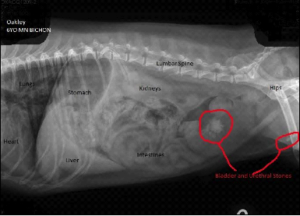Oakley* is a 6 year old purebred Bichon whose owners noticed he was really uncomfortable and had difficulty peeing. He was brought in to the Moncton Clinic, where Dr. Duerr discovered Oakley had Bladder Stones.

Bladder and kidney stones come in multiple different types; the most common two types are Struvite and Calcium Oxalate. Oakley had Calcium Oxalate, which is genetically linked to Bichon Frises, Mini Schnauzers, Lhasa Apsos, Yorkies, Mini Poodles and Shih Tzus. They occur 73% of the time in males over females, and typically between 5-12 years of age. It can be controlled and prevented with a special diet, but requires regular check-ups, radiographs (X-Rays) and blood monitoring for kidney and bladder health.
Oakley’s owners had an unfortunate change in circumstances and could not afford his surgery and the long-term care to manage this lifelong disease. Oakley was relinquished to our care, and with the help of our Oscar Fund and donations, received life-saving surgery to remove the stones that were blocking his urethra and bladder. He was adopted by a family that has another Bichon that is also living with this condition, and is very happy eating his new special diet with his new special friends
Before purchasing a pet, please consider researching the common diseases to watch out for and plan for worse-case scenario. Pet insurance is becoming more and more popular for a reason; to help wonderful families stay together when illnesses develop.
*Names have been changed to protect the furry
Further Reading: https://en.wikipedia.org/wiki/Bladder_stone_(animal)



